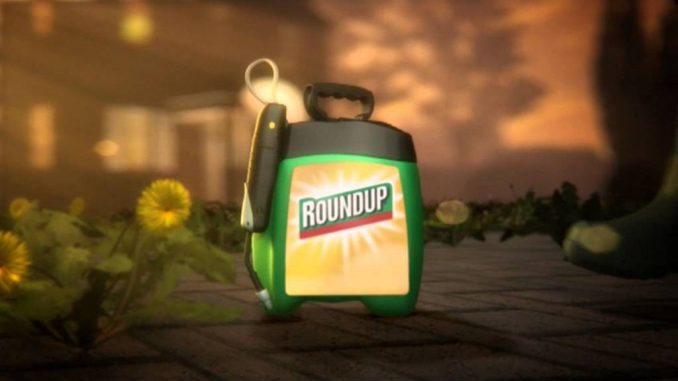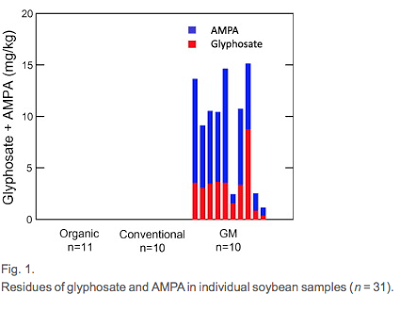
Just about all of us are aware of Roundup, Monsanto’s ultimate answer to the weeds that plague gardeners and farmers alike. This glyphosate-based herbicide (GBH) is famous for its ability to kill weeds right to the root as shown in this video:
Roundup and its sister GBH-based herbicides are extremely popular; these chemicals are applied to at least 24 percent of the total global cropland and are also in heavy use in both domestic and urban environments. Glyphosate is the world’s most widely used herbicide with 620,000 tons being produced in 2008 alone. With all of this herbicide in use, one has to wonder how much of an impact it has on both the environment and human life. Fortunately, researchers in the United Kingdom, France and Italy have answered that question for us in a paper entitled “Transcriptome profile analysis reflects rat liver and kidney damage following chronic ultra-low dose Roundup exposure” recently published in the Environmental Health Journal.
Let’s open by noting that residues of glyphosate-based herbicides are pretty much ubiquitous in our world. Traces of GBH end up in drinking water through rain, surface runoff and percolation into groundwater and are also found in the food that we eat. In fact, this 2014 study found that soybeans that were genetically modified to withstand the application of GBH (i.e. Roundup Ready soybeans) contained glyphosate in both plant leaves and beans whereas there was no glyphosate in soybeans that were either conventional or organic. In some cases, the levels of glyphosate residue were “extreme, far higher that those typically found” as shown on this graphic:
AMPA stands for aminomethylphosponic acid, the major byproduct of glyphosate degradation. In case you wondered how important soybeans are to our diet, in 2011 – 2012, soybeans were planted on 30 million hectares or 74 million acres of cropland in the United States with 93 to 94 percent of the crop being Monsanto’s Roundup Ready genetically modified soy. This same GM soy accounted for 75 percent of the world’s total soy production in 2011. Soy is widely used in the food industry and is the second largest crop in the United States in terms of cash sales and the number one American export crop. The majority of soy is processed into oil and meal and is used to make shortening, margarine, cooking oil and salad dressing. Lecithin, a natural emulsifier is extracted from soybeans and helps keep the chocolate and cocoa butter in candy from separating. Soy is also incorporated into animal feed.
Now that we have that background, let’s look at the study. First, the rats used in the study were divided into two groups; a control group and a group that was given an ultra-low daily dose of glyphosate in their drinking water over roughly a two year period. The daily intake of glyphosate was 4 nanograms (one billionth of a gram) per kilogram of body weight, the same level that is representative of what may be found in contaminated tap water. As well, it is important to note that the level of glyphosate used is well below the global acceptable daily limit.
In the past, it has generally been thought that glyphosate poses minimal health risks to mammals since the biosynthetic pathway that these herbicides use is present in plants and some bacteria and absent in vertebrates. After the rats used in the study were euthanized, their bodies were examined and it was found that the livers and kidneys were the two organs most affected.
Let’s look at the key results:
1.) Male rats appeared to suffer more acute damage to their livers and kidneys and this resulted in an increased rate of premature death.
2.) Roundup treated female rats showed three times as many anatomical signs of pathology in their kidneys and livers than the control group.
3.) A testosterone/estrogen imbalance was detected with testosterone serum levels increased by 97 percent compared to the control group. This suggests that there are endocrine disrupting effects of glyphosate.
Findings from previous studies in which mice were fed diets containing Roundup-tolerant genetically modified soybeans also showed marked increased liver aging among other issues, observations that were backed by this study.
The authors of the study conclude with the following:
It was previously known that glyphosate consumption in water above authorized limits may provoke kidney failure and reproductive difficulties. The results of the study presented here indicate that consumption of far lower levels of a GBH formulation, at admissible glyphosate-equivalent concentrations, are associated with wide-scale alterations of the liver and kidney transcriptome that correlate with the observed signs of hepatic and kidney anatomorphological and biochemical pathological changes in these organs. In addition, as the dose of Roundup we investigated is environmentally relevant in terms of human, domesticated animals and wildlife levels of exposure, our results potentially have significant health implications for animal and human populations. Furthermore, data also suggests that new studies incorporating testing principles from endocrinology and developmental epigenetics, in particular to evaluate the endocrine disruptive capability of GBH/glyphosate, should be performed to investigate potential consequences of low dose exposure during early life as well as in adults.”
With soybeans becoming such an integral part of our diet, whether we realize it or not, and the use of Roundup Ready genetically modified soybeans nearly cornering the market, this study should give us reason to question the growing use of Monsanto’s headline herbicidal product.
Click HERE to read more of Glen Asher’s columns


Be the first to comment